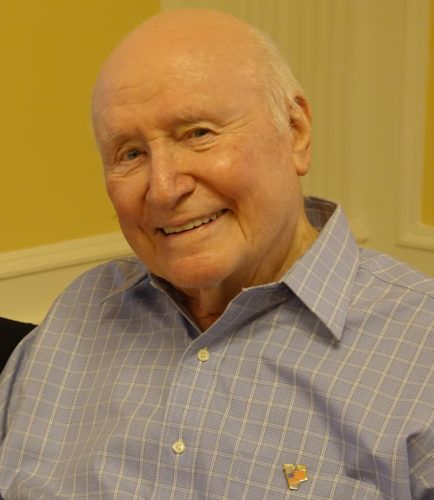In honor of Veterans Day, historian and cryptanalyst Dr. Henry Graff gave a talk on “Winning WWII off the Battlefield” to a group of Sterling Park residents at The Osborn. He shared his personal, behind-the-scenes story about the pivotal role of codebreaking during World War II. Dr. Graff and his wife are residents of The Osborn.
Dr. Graff was a Japanese language officer and cryptanalyst in the Signal Security Agency (now the National Security Agency) during World War II. He has an M.A. and a Ph.D. in History from Columbia University where he also studied Japanese.
Dr. Graff enlisted in the Army shortly after Pearl Harbor, and rose from private to first lieutenant in the Signal Corps. In this role, he read foreign codes and ciphers, notably the now famous “Purple Code” that proved invaluable to the Allied planners in England. One of the most significant encoded messages had been sent by Lt. Gen. Hiroshi Oshima, the Japanese Ambassador to Germany, to the Japanese Foreign Minister in Tokyo, detailing the German preparations in Northern France to repel the expected cross-Channel invasion force. Hitler had confided his plans to Oshima during a tour through the region days before.
Dr. Graff was part of a team of three codebreakers, working under the direction of the eminent cryptographer Frank B. Rowlett, which deciphered Oshima’s message. The resulting 20-page pamphlet containing this top-secret information was sent directly to Gen. George C. Marshall, Chairman of the Joint Chiefs of Staff, and immediately on to Gen. Dwight D. Eisenhower who was commanding the theater of operations.
Dr. Graff said, “I was later told that 25,000 lives were saved because of the information revealed in this document.” He added, “Churchill stated that being able to read these codes shortened the war by two years!”
It wasn’t just this one instance in which Dr. Graff’s efforts had transformative results. The BBC noted in its documentary Hiroshima that Graff also translated an intercepted communique from the Japanese to the Soviet Union, making Graff the first American to know of Imperial Japan's imminent surrender.
Dr. Graff received a War Department Citation and the Army Commendation Medal for his service at the time. After the war, he joined the faculty of Columbia University, where he specialized in the history of the presidency of the United States and of American foreign relations. Under President Bill Clinton, he served on the Kennedy Assassination Records Review Board for which he received the James Madison Award of the American Library Association "as a champion of the right to know.” In 2005, Graff received an honorary Doctor of Letters degree from Columbia in recognition of his contributions to the field of American history, service to presidents of the United States, and to the University.
